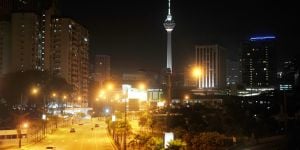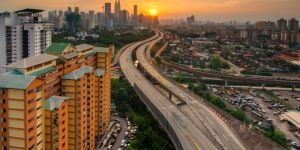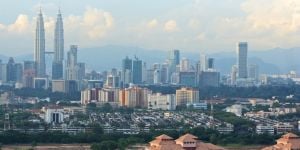Tips & Advice for Renting an Apartment in KL
Last activity 05 October 2018 by iantang
11669 Views
23 replies
Subscribe to the topic
Post new topic
Many expats arrive in Malaysia with little or no experience in renting accommodation. Here are some tips and advice on renting an apartment in Kuala Lumpur. The same advice pretty much applies to renting a house.
1. There are several ways to find suitable accommodation. You can browse websites such as www.iproperty.com.my or www.propwall.my or look in the English speaking newspapers or call a property agency. If you have already decided on an apartment building where you’d like to live, ask at the Management Office if they know of any apartments for rent or if they can recommend an Agent. Sometimes apartments for rent can be found on Condominium Notice Boards.
2. Once you are in contact with a property agent, let them know your budget and requirements and which part of the city you wish to live. Agents commonly work together so if your agent doesn’t have something suitable in the area you have chosen, he/she can easily contact other agents.
3. After you have found a place you like, negotiate the asking rent. Today there is a big oversupply of available accommodation and landlords are more desperate than before to find a tenant quickly. Leaving a place empty without a tenant for just one month could be losing the landlord more than he would lose by not accepting your offer.
4. Never pay a commission to the Agent. The Agent receives their commission from the landlord, which is usually equivalent to one months rent.
5. Tenancy Agreements are typically for one year or two years. It may be possible to negotiate a shorter length such as six months, but this may push up the rent. If you wish to rent for longer than two years then you could try to use this as a bargaining chip to lower the rent.
6. Look through the apartment or house and let the Agent know if there is anything you are unhappy with. It might be a worn out sofa that needs replacing, or an old fridge or microwave or you might want a new mattress. Perhaps the gas stove only has two rings working instead of four or the bedroom curtains let too light through. Check the taps and flush the toilets to make sure there are no plumbing problems. Also check that all rooms have air-conditioning and that they have recently been serviced. By opening the flap on the front of the air conditioner you can see how dirty it is by checking the blower and the filter. If they are dirty then ask for them to be serviced before you move in.
7. Check for damp walls and ceilings. This kind of problem is more common in lower end apartments and unless the problem is fixed quickly, it may get worse.
8. Check the security of the apartment. How easy would it be for someone to break in either through the front door or balcony or through a window? Some apartment buildings are so badly designed that it is easy to step across from a public area of an apartment building such as a stairwell onto your balcony. If such a security risk is there, ask that a grill be added over the window for security. If there is no grill door at the entrance to the apartment then you could try asking for the landlord to install one.
9. Make sure that all items that are in the apartment when you viewed it have been listed at the back of the Tenancy Agreement.
10. It is standard to pay a security deposit equivalent to two months rent. This deposit should be returned back to you at the completion of your tenancy Agreement, with some deductions for any damages that you may have caused. Also, a Utilities Deposit will be needed to be paid to cover any outstanding bills that you haven’t settled, such as telephone/internet bills, cable TV, water and electricity bills etc. This deposit is commonly equivalent to half a months rent. Keep all your receipts for deposits and rent paid.
11. In Malaysia rent is paid in advance on a monthly basis. It is never paid for up front for the entire tenancy period.
12. The Tenancy Agreement will state on which date of each month the rent should be paid, so try to pay it on time. There will be a clause in the Tenancy Agreement that allows you a little extra time to pay, usually an additional few days or a week. If you pay very late, the landlord may take action such as blocking all the access cards for enter the building or even cutting the water supply.
13. Property Agents often use a standardized Tenancy Agreement, but with clauses that may have been added or modified at the Landlords request. So, read through the Tenancy Agreement very carefully, and take your time. If there are any clauses that you are uncomfortable with then let the Agent know. As a landlord, the kind of clauses that I often modify relate to late payment of rent and extending the Agreement.
14. Servicing airconditioners. Once you have moved into your apartment, you are responsible for servicing the aircons. The Tenancy Agreement will probably state that you need to service them every three months, but every six months is usually fine. You can get the number of an aircon contractor from the Management Office, and servicing usually costs around RM90 – 120 per aircon for a general service, and RM150 – 180 for a full service including chemical washing the aircon unit and the outside compressor. If a problem exists with an aircon unit which cannot be fixed by servicing, then let the landlord know as he should pay for the repair or replacement of the unit.
15. Water Quality. You should run the taps when you visit an apartment to check for water quality. If the building is old and the landlord hasn't changed the water pipes then the water may be red or brownish in colour. You can also install a water filter in the kitchen or even ask the landlord to install a water filter at the water meter before it enters the apartment.
16. Get a Home Contents Insurance Policy. Most insurance companies offer this, and it’s not expensive. For a coverage of up to RM30,000 the premium is usually around RM200 per year.
17. The bills that you most commonly need to pay each month are electricity, water, television, internet and telephone.
18. The bills that you should not pay and which the landlord should pay are DBKL Assessment Bills, Indah Water (Domestic Sewerage Bill), Management Fees and the Fire Insurance Premium.
19. If you wish to extend your stay beyond the completion period of your Tenancy Agreement, there should be a clause in the Agreement that stipulates how many months notice you need to give. Let the landlord know, and if the landlord tries to increase the rent then indicate that if the rent increases you prefer to move out. The landlord may relent and agree not to increase. This is because when a tenant leaves, the landlord needs to fix up the apartment, sometimes repaint it, make a big cleaning, replace some items, and importantly, find another tenant, which might take time and will probably cost him/her a full months rent as commission to an Agent. You should sign an Extension Agreement, which is usually just half a page long with the basic terms of amount of rent, notice period and dates etc. And don't forget to get your stamped original copy of the Tenancy Agreement from the Agent.
20. Try to remain on good terms with your landlord. At the end of the Tenancy Agreement the landlord should return your deposits less any outstanding utility bills and deductions for any damages that you may have caused. A good landlord should not deduct anything for normal wear and tear and shouldn't make deductions for repainting or cleaning the apartment. An unhappy landlord might not be so nice.
21. If you have problems getting back your deposit, you can try to speak with the Agent, but do realize that Agents are usually on the side of the Landlord as it is he/she who pays their commission each time they bring a new tenant, whereas tenants come and go. If you cannot get your deposits back or you feel that the deposit returned is too little then try to speak (nicely) to the landlord. If that fails, then your choices are to either seek legal advice and that could be very costly and time consuming or to let the matter go. Lawyers typically send two or three letters to the Landlord followed by a Court Summons and that is going to take at least six months. Legal action is a last resort and unless the deposits are very large I personally think it is not worth following up due to the stress and cost involved.
22. It is normal for the Landlord to refund the deposit a few days after you have vacated the apartment. He/she will need time to check the cost to repair damages and damaged items and to check on any outstanding bills. It will help if you can give the landlord your latest utility bills shown as being paid. In Malaysia most utility bills can be paid at the Post Office.
23. The Management of the Apartment building will not want to get involved in any disputes between you and your landlord. These are considered as private matters and the Management will try to keep clear of them. The only time Management will get involved is when matters such as leaking or other similar problems occur and then they will contact the landlord.
I have served on three Condominium Management Councils/Owner’s Committees in Kuala Lumpur, as Chairman, Vice Chairman, ordinary Council Member and as an Advisor. I am a property investor, landlord and was a tenant when I first moved to Kuala Lumpur.
If you have any queries feel free to ask. I, or others will try our best to provide you with answers or advice.
My take, if you are going to look for cities to live or work like Kuala Lumpur or Penang, be aware that traffic can be terrible during rush hour and consider it worse when it rains. This is the reason why many choose to rent in a nearby hotel or share a house with mates. And another piece of advice, never take a home by mere looking at ads online, take a property agent after looking at the ads, call the man and ask all pertinent questions , the pros and cons are vital queries and then begin the trip. To guide you a bit, start it out from Roomz Asia, or this link, roomz.asia/445, browse hundreds of available rooms, and contact their agents.
lovephileo wrote:My take, if you are going to look for cities to live or work like Kuala Lumpur or Penang, be aware that traffic can be terrible during rush hour and consider it worse when it rains. This is the reason why many choose to rent in a nearby hotel or share a house with mates. And another piece of advice, never take a home by mere looking at ads online, take a property agent after looking at the ads, call the man and ask all pertinent questions , the pros and cons are vital queries and then begin the trip. To guide you a bit, start it out from Roomz Asia, or this link, roomz.asia/445, browse hundreds of available rooms, and contact their agents.
Thank you for your sharing lovephileo. No need to quote your post once again.
Thanks for your detailed advice, Hansson, makes life in KL better for us. I do have some questions, as I am about to sign a tenancy agreement. But the agent tells me different story for certain points, ie: Tenants are responsible for paying Indah Water.
1.) I doubt citing your article would help a lot. Do you have any official reference that we can use, to show the agent, and ensure we won't be cheated by the agent?
2a.) How should the deposit (security/utility) be paid best, in cash? cheque?
2b.) To whom should we make it payable to? the landlord? the agency of the agent? To my understanding, we shall not proceed with any payments to the agent without any 3rd party present.
3.) How is rent best paid? Bank transfer to the landlord directly? I guess best to go with something that provides black-and-white proof.
4.) Maintenance - there seems to be some minor water leak in the walls of the landed property I am about to rent. How can I ensure it gets attended to if it gets serious later on after fixing now? Any use to state it in the agreement?
5.) Is it the norm/acceptable that as tenants, do not pay the last 2 months rent, just in case landlord refuse to return security deposit?
Appreciate your response, as the many stories seen here and else where do cause plenty of concerns for expats new to Malaysia.
Thanks,
Alex
@ Alex > I regret but Hansson is no more a member of Expat.com. Hope that some other members will be able to assist you with your questions. 
Thanks,
Priscilla
Do you need a working permit in order to rent an apartment in Kuala Lumpur?
Thanks
aawun wrote:Thanks for your detailed advice, Hansson, makes life in KL better for us. I do have some questions, as I am about to sign a tenancy agreement. But the agent tells me different story for certain points, ie: Tenants are responsible for paying Indah Water.
1.) I doubt citing your article would help a lot. Do you have any official reference that we can use, to show the agent, and ensure we won't be cheated by the agent?
2a.) How should the deposit (security/utility) be paid best, in cash? cheque?
2b.) To whom should we make it payable to? the landlord? the agency of the agent? To my understanding, we shall not proceed with any payments to the agent without any 3rd party present.
3.) How is rent best paid? Bank transfer to the landlord directly? I guess best to go with something that provides black-and-white proof.
4.) Maintenance - there seems to be some minor water leak in the walls of the landed property I am about to rent. How can I ensure it gets attended to if it gets serious later on after fixing now? Any use to state it in the agreement?
5.) Is it the norm/acceptable that as tenants, do not pay the last 2 months rent, just in case landlord refuse to return security deposit?
Appreciate your response, as the many stories seen here and else where do cause plenty of concerns for expats new to Malaysia.
Thanks,
Alex
Indah Water is a very small bill usually paid by the landlord, but the amount is so small it doesn't make all that much difference who pays it.
You can pay your deposit in cash or by cheque, just be sure to get a receipt at the time of handing over the money.
The Agent might ask you to split the deposit into one months rent cash (for the Agent as their commission) and the rest for the landlord. It all depends on them, there is no fixed rule.
I paid by bank transfer to my landlord when I was a tenant. It's common also to pay the Agent each month. Be sure to get a receipt for every payment that you make.
It's better to ask the landlord to fix any leaks before you move in. As a former tenant with a nice landlord, I have ever quoted him the cost of repair work over the phone and agreed with him to deduct it from the monthly rent and then take care of it myself. But better to get the leaking problem sorted out before moving in.
You are expected to pay the last two months rent. And the landlord has the right to make deductions from those two months deposits for any damages that you might have caused or missing items during your tenure. If you try to avoid paying the last two months rent, the landlord will usually be angry and might create problems for you such as cutting the water or electricity. This is actually illegal but if you play dirty so might he. If it is clear that the landlord might not return the deposits then really it's up to you, but you really should not assume the two months deposits will be used for the last two months rent.
does anyone have any good real estate agents they could recommend for the Mont Kiara area? Thanks!
You can try this guy. He's a good friend and also my RE agent. Lai: ***
Reason : Share these details through the private messaging system please.
We invite you to read the forum code of conduct
sabai_girl wrote:does anyone have any good real estate agents they could recommend for the Mont Kiara area? Thanks!
Just go to any of the main property websites in KL and look they always list an agent and their name and contact number beside the listing. Agents nearly always work together and split the commission. They begin by showing you the properties that they have exclusivity on, and if that doesn't work then they cooperate with their agent friends to show more properties. I don't really think there is all that much difference between any of them. Just be careful before signing anything.
Hi,
May I know how do I know I am dealing with the real landlord when signing the agreement and paying the rental amount. Thanks in advance.
You can go to the Management Office in any condominium to check the name of the owner of a unit
Gravitas wrote:You can go to the Management Office in any condominium to check the name of the owner of a unit
Thank you very much for the info. But I plan to rent a landed house in Horizon Hill Johor which is individual strata. Then how can I verify the property owner of the unit I am going to rent. Thanks in advance.
Excellent article thank you!
I've a question, it's possibile rent to another people the appartment that I rent?
Thank you,
Enrico
Hi! I will be doing my internship soon at KL. And im eyeing on this one studio at Hartamas. Is it possible for me to rent only up to 4 months? as this is my internship duration. if anyone can answer this, id be very grateful!
Do you mind telling me the steps on renting an apartment while im still at my home country? Whats usually the process like?
ErJ wrote:Do you mind telling me the steps on renting an apartment while im still at my home country? Whats usually the process like?
What do you mean?
ErJ wrote:Hi! I will be doing my internship soon at KL. And im eyeing on this one studio at Hartamas. Is it possible for me to rent only up to 4 months? as this is my internship duration. if anyone can answer this, id be very grateful!
Depends on the owner. Though, it must be said that most home owners or landlords do not favor short term rentals. In that case, your best bet is probably Airbnb.
enricomaso85 wrote:Excellent article thank you!
I've a question, it's possibile rent to another people the appartment that I rent?
Thank you,
Enrico
Check your Tenancy Agreement. If it is not stipulated, by contract, you are not allowed to do so unless with prior agreement with the landlord before drafting the Tenancy Agreement.
However, I must say that you can still do so. But if you're caught or your landlord finds out, you're screwed.
Articles to help you in your expat project in Kuala Lumpur
 Kuala Lumpur's neighbourhoods
Kuala Lumpur's neighbourhoodsKuala Lumpur is a real megalopolis, surrounded by suburbs and neighborhoods so different from each other that they ...
 Buying property in Kuala Lumpur
Buying property in Kuala LumpurWhen you plan to move to another country or another city, your first concern is undoubtedly where you are going to ...
 Accommodation in Kuala Lumpur
Accommodation in Kuala LumpurThe city of Kuala Lumpur offers a wide range of accommodation options. Many expats opt for luxury condominiums or ...
 Accommodation in Johor Baharu
Accommodation in Johor BaharuJohor Bahru is located in the southernmost region of Peninsular Malaysia, just across the border with Singapore. ...
 Accommodation in Malaysia
Accommodation in MalaysiaFinding accommodation in Malaysia is relatively simple as there is no shortage of accommodation for foreigners in ...
 Getting around Kuala Lumpur
Getting around Kuala LumpurOne of the advantages of moving to Kuala Lumpur when settling in Malaysia is the quick access to many facilities ...
 Universities in Kuala Lumpur
Universities in Kuala LumpurKuala Lumpur is ranked second in the world in terms of affordability of higher education. The city is a thriving ...
 Working in Kuala Lumpur
Working in Kuala LumpurKuala Lumpur is a fast-paced city, where work is often at the heart of people's lives. As Malaysia's most ...
Find more topics on the Kuala Lumpur forum



